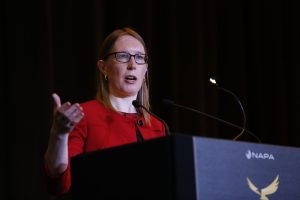Speaking at the 2018 NAPA DC Fly-In Forum in Washington on July 24, Securities and Exchange Commissioner Hester Peirce argues that the proposed Regulation Best Interest would set clear standards, even though the word “fiduciary” is not directly incorporated in the proposal.
Addressing critics who remain unsatisfied, Peirce, who was sworn in in January 2018 and was speaking on her own behalf, explained that the word can carry a lot of meanings and what’s important is the context in which it is used.
Latin ‘Levers’
To make her point, Peirce told a story about how she misunderstood the Latin term, “malo malo malo malo.” For years, she thought the term meant “bad, bad, bad” or “evil, evil, evil,” but she came to find out later that the loose translation means, “I’d prefer to be a bad man in an apple tree rather than the mast of ship” or “I would rather be in an apple tree than a wicked man in adversity” or some variation thereof.
Regardless of which translation you choose, she noted that the same word can have different meanings and can lead to confusion. “For retirement investors, for example, confusion arises from the use of the word ‘advisor’ by both investment advisors and broker/dealers,” Peirce said, as she explained why the agency proposed to limit use of the term by certain broker-dealers when communicating with a retail investor.
[caption id="attachment_83174" align="alignright" width="300"] Securities and Exchange Commissioner Hester Peirce speaks at the 2018 NAPA Fly-In Forum in Washington, D.C.[/caption]
Securities and Exchange Commissioner Hester Peirce speaks at the 2018 NAPA Fly-In Forum in Washington, D.C.[/caption]
In addition, she noted that a fiduciary under ERISA means something other than a fiduciary under the Investment Advisers Act. To that end, she lamented that the word fiduciary has become so powerful that some critics are assailing the SEC’s proposal solely on the absence of the word in the new standard. Investors are constantly told that all they need to ask of financial professionals is whether they are a fiduciary, but by suggesting that a single word will protect investors dissuades them from asking the questions they should ask before choosing a financial professional, Peirce suggests.
And further noting that some commenters would have liked for the agency to go further and require broker/dealers to call themselves “sales people,” Peirce explained that there are all sorts of tricks-of-the-trade that can be used to cultivate trust and then abuse it, no matter what title is used. “In the end, it really isn’t the title that someone uses, it’s the standard to which they are held that matters,” Peirce argued.
‘Best Interest’ Standard
Despite criticism that the SEC’s proposed best interest standard is inferior to fiduciary duty, Peirce contends that they are very similar. She notes, for example, that, while the proposed Regulation Best Interest does not include an explicit duty of loyalty, a broker/dealer would be required to have procedures in place to ensure disclosure of all material conflicts of interest and mitigation or elimination of any material financial conflicts of interest.
“Rhetoric aside, arguably the proposed Regulation Best Interest standard would subject broker/dealers to an even more stringent standard than the fiduciary standard outlined in the commission’s proposed interpretation,” she states.
Peirce does note that she would have preferred a simpler approach in developing the standard. She explains, among other things, that she would not have referred to the standard as “best interest,” contending that it does not attempt to define the term because nobody can explain precisely what it means. More importantly, she contends, is that the proposal appears to send a message to investors that they don’t need to ask questions, which is precisely the opposite of what investors should be doing.
In addition, she suggests that, despite what critics have said, the suitability standard applicable to broker/dealers “has teeth and has been effective.” Peirce would have preferred the new standard to build on suitability as one component, while adding a second component that a broker/dealer cannot put their interest ahead of the interests of the retail customer. She believes that these changes, together with the customer relationship summary, would have sufficiently addressed conflict of interest concerns.
Proposed Interpretation and Form CRS
Peirce also says that she takes issue with part of the proposed interpretation as it relates to the advisor’s fiduciary duty. According to Peirce, the SEC states that the duty of loyalty component of an advisor’s fiduciary duty requires the advisor to acquire informed consent from its clients to any material conflict of interest that could affect the advisory relationship. But as authority for this informed consent requirement, she notes that the Commission does not cite court decisions or other legal precedents, but cites instructions to form ADV which, she said, “is not typically considered an authority.”
And while she supports the objectives of encouraging investors to ask questions regarding the services that their financial providers offer, Peirce is concerned that the approach in the Form CRS ties the hands of providers when it comes to communicating with investors.
She told the Fly-In Forum delegates that she is particularly interested in hearing whether the Form CRS is enough or does the agency need the disclosure mandated in the Regulation Best Interest standard. In addition, she’s interested in hearing how the agency can modify the rule to allow for experimentation with more multimedia-based approaches.
Comments on the Regulation Best Interest standard are due to the SEC by Aug. 7.

